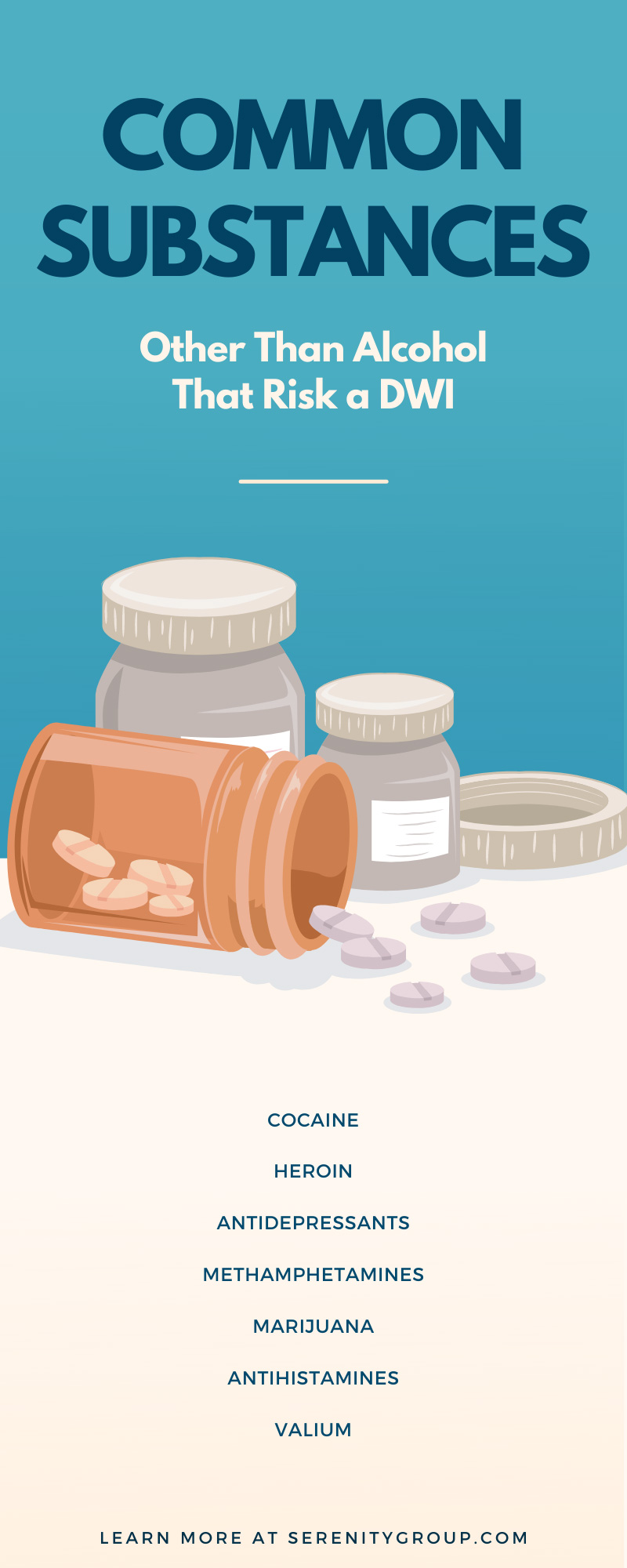Common Substances Other Than Alcohol That Risk a DWI

Driving while intoxicated or impaired refers to driving while your mental or physical abilities have been significantly harmed by drugs, alcohol, or a combination of the two. Certain states have zero-tolerance legislation, which means you could be punished with an alcohol or drug-related driving crime if you drive with any level of alcohol or drugs in your system. Many people are unaware that you do not need to be driving to acquire a DWI; you merely need to be operating the car, which includes turning on the engine and engaging the vehicle’s equipment. In the case that you didn’t know these bits of information, read on to find out about the other substances that can make you at risk for a DWI.
What Is the Difference Between a DUI and a DWI?
The terms DUI and DWI have significantly different definitions: A DUI stands for driving while intoxicated or impaired, whereas a DWI stands for driving while inebriated or impaired. A DUI charge indicates that the driver was under the influence of alcohol or drugs while driving. It’s worth noting that the drugs don’t have to be illegal. If a person gets impaired as a result of using prescription or over-the-counter medicines, they may still be charged with DUI. Whether you’re charged with a DUI or a DWI, the charge is only brought against you if a law enforcement officer can establish you were too intoxicated to drive.
While the changes in nomenclature may appear to be a semantics game, the fundamental distinctions between these two charges are decided by the state in where the incident occurred and the BAC limitations that have been imposed. DUI and DWI cases differ from one state to the next. In fact, other states use entirely different terms to charge someone who has driven a car while intoxicated.
Substances That Can Cause You To Receive a DWI
One thing that many drivers are unclear about are the different substances besides alcohol that can cause you to receive a DUI or DWI. Here are some of the most common substances:
Cocaine
You could be charged with Driving While Ability Impaired by Drugs if you’re accused of driving while under the influence of illegal drugs. Cocaine can make you feel disoriented and confused, as well as irritated, paranoid, and violent, which can lead to road rage. Cocaine can also make you dizzy, which is exacerbated when combined with alcohol.
Methamphetamines
Excitation, hallucinations, and delusions are all possible side effects of methamphetamines, popularly known as meth. When you’re high on meth, you could have trouble controlling your impulses. This drug can also promote insomnia, making you tired and foggy as a result of not getting enough sleep. You may act rashly and drive carelessly as a result of the symptoms of meth usage.
Heroin
Heroin, morphine, and other opiates produce intense exhilaration, as well as lethargy, drowsiness, and a feeling of being disconnected. You may have nausea or vomiting, as well as a muddled mental condition. You may not be able to stop or turn your automobile as quickly as you need to for safe driving when under the influence of heroin.
Marijuana
Unfortunately, lawful substances, such as prescription pharmaceuticals, might result in a charge of Driving While Ability Impaired by Drugs if they are scheduled controlled substances. Doctors’ prescriptions for painkillers and amphetamines are one example. Furthermore, if you are impaired by marijuana, you are not permitted to drive. Marijuana might make you feel drowsy and disoriented, slowing your reaction time and increasing your chances of getting into a car accident. You may feel drowsy or paranoid, and your perception of space and time may be affected. It is illegal to drive while under the influence of marijuana.
Antidepressants
Pay close attention to the cautions on prescription drugs, such as antidepressants. If you’re concerned about losing your ability to drive, speak with your doctor about alternate possibilities. Some antidepressants have sedative properties and can produce impairment comparable to drunk driving. Many antidepressants are classified as prohibited medications, making it illegal to drive while impaired. Antidepressants should not be combined with alcohol.
Antihistamines
Even over-the-counter drugs come with warning labels that should be read carefully. When combined with alcohol, several antihistamines delay your reaction time and impair your coordination. When driving, look for antihistamines that don’t have these adverse effects or take fewer doses. While they are generally legal, they might cause issues when used with other narcotics or alcohol.
Valium
Valium, like sedating antidepressants, can produce impairment equivalent to driving while intoxicated. Because even a small dosage of Valium might impair your judgment and mental capacity, have a friend or family member drive you when you are using this medication.
Sleeping Pills
The effects of your sleeping medications, both over-the-counter and prescription, can remain even after a full night’s sleep. Before driving, take the least effective dose and discuss your concerns with your doctor.
Do DWIs Impact Insurance Rates the Same Way DUIs Do?
Your insurance rates will almost certainly rise if you are charged with a DUI or DWI. In some situations, you may be dropped totally from your insurance policy. The amount by which your insurance premium rises is mostly determined by your insurance company. However, your insurance prices will almost always increase or treble in comparison to what they were previously.
After a DUI or DWI, you may be forced to acquire an SR-22 or FR-44 auto insurance certificate depending on your insurance carrier’s and/or state’s regulations. SR-22 or FR-44 is a certificate of financial responsibility that certifies that you have met and will continue to satisfy your state’s current car insurance requirements for a specific period of time (typically three years). When drivers attempt to reinstate their suspended license after being charged with a DUI or DWI, these are frequently necessary.
We hope you have found our article on the common substances other than alcohol that risk a DUI to be helpful. If you have recently been convicted for a DUI or DWI, be sure to seek out to Serenity Group! We are dedicated to helping you get through this difficult time and back on the street as soon as you are able to!


Recent Comments